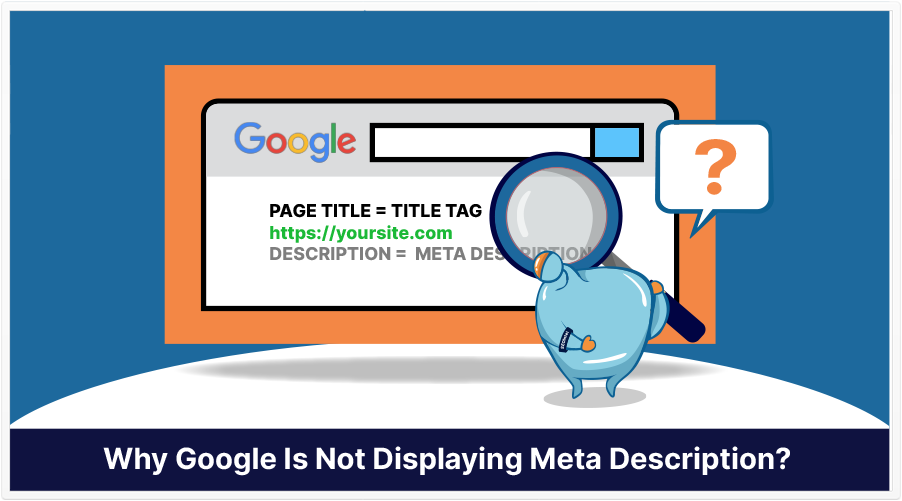
For detail-oriented folks who try to create great web experiences, it can be quite annoying when a Google serp (search engine results pages), which has one of our pages, doesn’t display the meta description we want it to.
You may have craftily and thoughtfully written a succinct, keyword-oriented, grammatically correct, helpful meta description that fits the generally advised 120-character limit, yet still…Google chooses to display something else for your page.
Why does this happen?
In the most recent English Google SEO office-hours (which is basically a recorded Q&A conference call), a participant stated that when he does Google searches and sees his client’s page, the description Google displays is not the one in the page’s meta description.
Google’s John Mueller, who was on the call to provide insights and answers, understood the participant’s statement and offered some of his insights.
Before I get into them, I should say that Mueller mentioned something obvious–so obvious I won’t even really count it, but I’ll just say it here to reiterate the importance of fundamentals: it’s good to have a meta description.
He did say to double-check that, so I recommend you do so from a coding/technical perspective. Sometimes, there may be omissions where, depending on the CMS (content management system) and plugins you use, someone may have not put the meta description in the proper field for your page.
One example is this site that I write for: I write a meta description for each news item, and the way our wp-admin is arranged, I have to paste it in a specific field for it to be seen as a meta description.
So, what follows are the 3 reasons Mueller stated for why this may happen. I’m not sure if these are the only 3 causes there are, but they’re likely to be the most common ones. It could also be that a combination of these can be contributing to your specific situation.
#1: If You Have the Same (Or Extremely Similar) Meta Description for Multiple Pages, Google’s Systems May Try to Create Their Own Description for Your Page
Let’s suppose that many pages of your site have the same meta description. Each page may have slightly (or vastly) different content.
When Google sees the meta description of a given page, and sees that it’s identical to many others on your site, it may hypothetically ask, “Well…what makes this page different from the others, and why should I display this page instead of the others for a given search query?”
Google may not want to display your meta description because your meta description is identical to that of many other pages, so it may create its own meta description for your page.
In this regard, Mueller stated that “…sometimes we do a pretty good job, and sometimes, we don’t do such a good job.”
#2: If Your Meta Description Is Spammy, Google May Not Display It
If you think about it, this makes sense, as a spammy-looking description may seem unpleasant to the eye. (Not that Google’s attempt may be much better.)
And speaking of making sense, that’s why your meta description has to make sense grammatically. When I think of writing a meta description, yes, I do try to include as many keywords and variations as I can, but never at the expense of proper word order, syntax, and readability.
#3: Depending On the Search Query, Google May Use Other Text It Finds on Your Page
Let’s say that your meta description gives a general overview of your product. It’s well-written, non-spammy, and is under 120 characters in length.
Great.
Let’s further suppose that, deep within your page’s content, there’s a specific piece of data (a statistic, an ISBN, an SKU number, a serial number, etc.) pertaining to your product.
Now, if that specific piece of data is what the searcher typed into Google, then there’s a possibility that your page shows up in the search results. If that happens, then with your listing, where your meta description would normally be, that specific piece of data can be displayed.
So, instead of displaying your meta description (which doesn’t include the searcher’s query), Google displays a portion of the text that has your searcher’s query.
That’s understandable.
What About Mass-Generated Pages That May Have Mass-Generated Meta Descriptions?
During that same segment, the participant implied that his client’s site (I think it’s an e-commerce site) had many meta descriptions that were created based on templates, so that a lot of them would be somewhat similar.
“I think that’s usually okay,” Mueller said. And to that, I’d add that each meta description, even if they’re formulaic, should be unique. (Every page, really, should be unique.)
And it makes sense if you think about it: the reason why you have a single page is that there must be something (the content, usually) that distinguishes it as separate from all other pages. The meta description should reflect that.
So, what we’ve learned from all this is something that’s a reconfirmation: unique content, unique pages, unique meta descriptions. That’s what Google’s looking for.